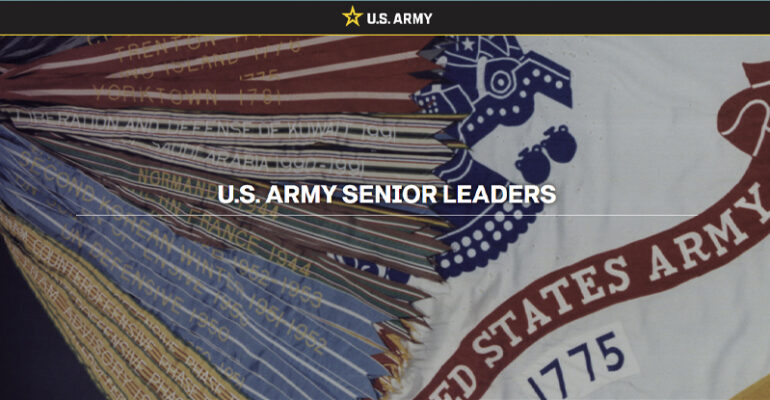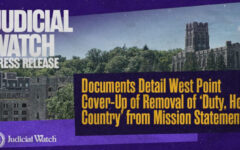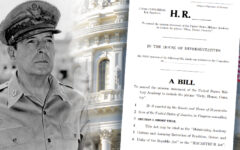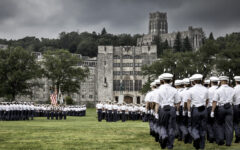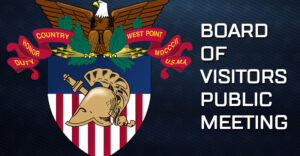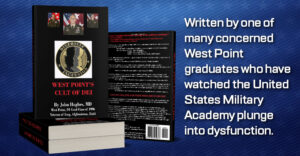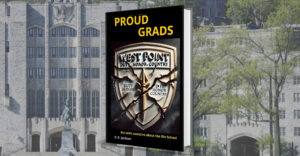West Point Leadership Turns Its Back on ‘Duty, Honor, Country’
15 March 2024 2024-03-15 17:41West Point Leadership Turns Its Back on ‘Duty, Honor, Country’
by Francis P. Sempa | American Spectator
The headline in the Washington Times reads: “West Point deletes ‘duty, honor, country’ from mission statement.”
The letter announcing this from West Point Superintendent Lt. Gen. Steve Gilland recommends that the iconic phrase be replaced with the following mission statement:
“To build, educate, train, and inspire the Corps of Cadets to be commissioned leaders of character committed to the Army Values and ready for a lifetime of service to the Army and Nation.”
The letter states that “[b]oth the Secretary of the Army and the Army Chief of Staff approved this recommendation.”
Gilland explained the change by stating that it was the “result” of an “assessment” — an 18-month review of the Academy’s purpose — made by “leaders from across West Point and external stakeholders,” and that the change reflects their “vision, mission and strategy” to “bind[] the Academy to the Army.”
The Academy’s mission statement, he pointed out, has been revised nine times in the last hundred years. And he added that “[t]he Army Values include Duty and Honor, and Country,” and that “Duty, Honor, Country” remains the Academy’s motto.
Sixty-two years ago, Douglas MacArthur, general of the Army, told the cadets at West Point that if the “long gray line” ever failed us, “a million ghosts in olive drab, in brown khaki, in blue and gray, would rise from their white crosses, thundering those magic words: Duty, Honor, Country.”
Today, it is not the long gray line that fails us but the woke leadership of the Army that seems intent on substituting “Diversity, Equity, and Inclusion” for “Duty, Honor, Country.”
Make no mistake about why “Army Values” are replacing “Duty, Honor, Country.”
Army values, as we have seen, are subject to change. Today, Army values comprise “Diversity, Equity, and Inclusion.”
Who knows what those values will be a decade from now.
Duty, Honor Country, on the other hand, represent a timeless mission.
But don’t take my word for it. MacArthur said it best.
MacArthur characterized Duty, Honor, Country as hallowed words that “reverently dictate what you ought to be, what you can be, what you will be.” Those words “build courage when courage seems to fail”; help you “regain faith when there seems to be little cause” for it; “create hope when hope becomes forlorn.”
What else do those words do? According to MacArthur:
“They build your basic character. They mold you for your future roles as the custodians of the nation’s defense.
They make you strong enough to know when you are weak, and brave enough to face yourself when you are afraid.
They teach you to be proud and unbending in honest failure, but humble and gentle in success … to learn to stand up in the storm but to have compassion on those who fall; to master yourself before you seek to master others; to have a heart that is clean, a goal that is high….
They teach you in this way to be an officer and a gentleman.”
“The code which those words perpetuate,” MacArthur continued, “embraces the highest moral laws and will stand the test of any ethics or philosophies ever promulgated for the uplift of mankind.”
The Army’s mission, MacArthur reminded them, “remains fixed, determined, inviolable: it is to win our wars.”
He told the cadets that the “very obsession of your public service must be Duty, Honor, Country,” not vague, imprecise, changeable “Army Values.”
MacArthur knew that there were among us those he termed “pedants,” “demagogues,” “cynics,” “hypocrites,” and “troublemakers” who believe that the words “Duty, Honor, Country” are nothing but a “slogan” or a “flamboyant phrase,” and who “will try to downgrade them even to the extent of mockery and ridicule.”
Little could he have imagined that it would be the Army’s leadership who would promote their downgrade, who would delete the “hallowed words” from West Point’s mission statement.
MacArthur memorably ended his speech by noting that he had little time left on this earth:
“The shadows are lengthening for me. The twilight is here. My days of old have vanished, tone and tint…. I listen vainly, but with thirsty ears, for the witching melody of faint bugles blowing reveille, of far drums beating the long roll. In my dreams I hear again the crash of guns, the rattle of musketry, the strange, mournful mutter of the battlefield.”
“But in the evening of my memory,” he said, “always I come back to West Point. Always there echoes and re-echoes: Duty, Honor, Country.”
Not anymore at West Point.
Also read by Francis Sempa:
The Military Academies Have Turned Into Woke Wastelands
Joint Force Quarterly Enters Wokeland

